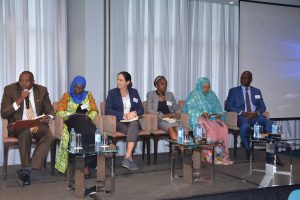
Human-Wildlife Conflicts (HWC) manifest in the form of human and wildlife deaths, injuries, crop damage, property destruction and livestock depredation. It also results in displacement of both wildlife and humans and disruption of socioeconomic activities, leading to conservation apathy and economic loses. HWC imposes major economic and human costs on local communities (small holder famers, small scale traders and low-income households) in many parts of the world, particularly around protected areas.

The Ministry of Tourism and Wildlife in collaboration with KWS, AB Consultants, IIED and The Darwin Initiative hosted a consultative forum to discuss possible solutions to designing an HWC compensation scheme. The forum, held on 15th May 2019 in Nairobi, was attended by over 150 practitioners drawn from government, private insurance and NGOs.
The forum was kicked off by Permanent Secretary for the State Department of Wildlife, Dr. Susan Koech giving welcome remarks and she urged the forum to think innovatively to address this challenge. She set the stage by stating that we have a major problem on HWC and we are here to have a conversation about it, in the hope that one day in the future, it will be said that there was a team that sat and solved this very important issue. She emphasized the need to conserve wildlife for posterity. Her sentiments were echoed by the CEO of the Insurance Regulatory Authority (IRA), Mr. Godfrey Kiptum who welcomed the insurance fraternity into the meeting. He affirmed that the insurance industry was ready to partner with the ministry on mitigating HWC.

The Cabinet Secretary of Tourism and Wildlife, Najib Balala gave the keynote address with a special focus on why the time is right, to do something. Balala mentioned that when he was appointed to his current role, he found HWC as the elephant in the room (all pun intended). He said that the last sessional paper on HWC was done in 1975 and there has been no attempt since then. He painted a broad picture on what the government has been doing to try and provide policies to benefit communities co-existing with wildlife and admitted that the policies have not been exhaustive. He urged the practitioners in the room to think up ideas that he is looking forward to proposing for implementation through parliament. He emphasized the need to review the wildlife act to ensure that it provides a balance for communities living with wildlife.
The moderator for the session, Dr. Julius Kipng’etich turned out to be the bridge between conservationists and insurance, seeing as he was previously Director General at KWS and is currently the CEO of Jubilee Insurance, a leading insurer in the region. Dr. Kipng’etich asked some key questions that would help in shaping any insurance product on HWC. He asked why should we call it conflict? Who owns the wildlife? Who benefits from the wildlife? How do we manage population pressure? How do we cross-learn from other successful HWC schemes? Do we need to reform KWS?
The Director General of KWS Brig (Rtd) J.M Waweru made a presentation on the state of HWC in Kenya highlighting some of the challenges KWS faces and some of the successful mitigation strategies they have employed. A panel of conservationists spoke on the overarching strategy of HWC in Kenya. The panel spoke of the root being climate change that has contributed to a spike in HWC. The panel urged the government to develop incentives for people to carry out conservation as an investment on their land near protected areas, rather than other forms of development. The use of scientific data as a tool to understand wildlife behaviours and patters was emphasized, which will also be useful in designing any solutions to mitigate HWC, including insurance. A member of parliament who sat on the panel urged the forum to bring innovative ideas on how to mitigate HWC to the wildlife committee and she promised to lobby for any good ideas to be tabled in parliament.

There are existing compensation schemes in protected areas which are mostly funded by donors, NGOs and local communities to provide some compensation when community members experience losses arising from HWC. Some of these compensation schemes shared their experiences on a panel discussion. One of the main outputs from this panel was the importance of a wholistic approach to compensation and not just money. The successful compensation schemes focused on simplicity, involving the communities in validating claims, low compensations and quick turn-around times.
The insurance industry panel was represented by senior executives from CIC Insurance, Acre Africa, APA Insurance and MINET. The representatives said that the insurance industry is more innovative now than it was 10 years ago when the idea of HWC insurance was first floated. Now the insurance sector is more ready to insure new risks and to innovate. The panel emphasized on the need for historical data to enable actuaries to price the product using trend analysis. The insurers mentioned there could be different approaches to addressing the risk depending on ownership of the wildlife and risks to be covered. The main risks faced by communities is death, injuries, death of livestock and damage to crops and property.
The forum was closed with the PS of the State Department of Wildlife giving action points to various participants and with a call for urgency.
We at AB Consultants have over the last 6 months been carrying out research to explore how microinsurance can be used to mitigate HWC. We will share regular updates and our findings.



